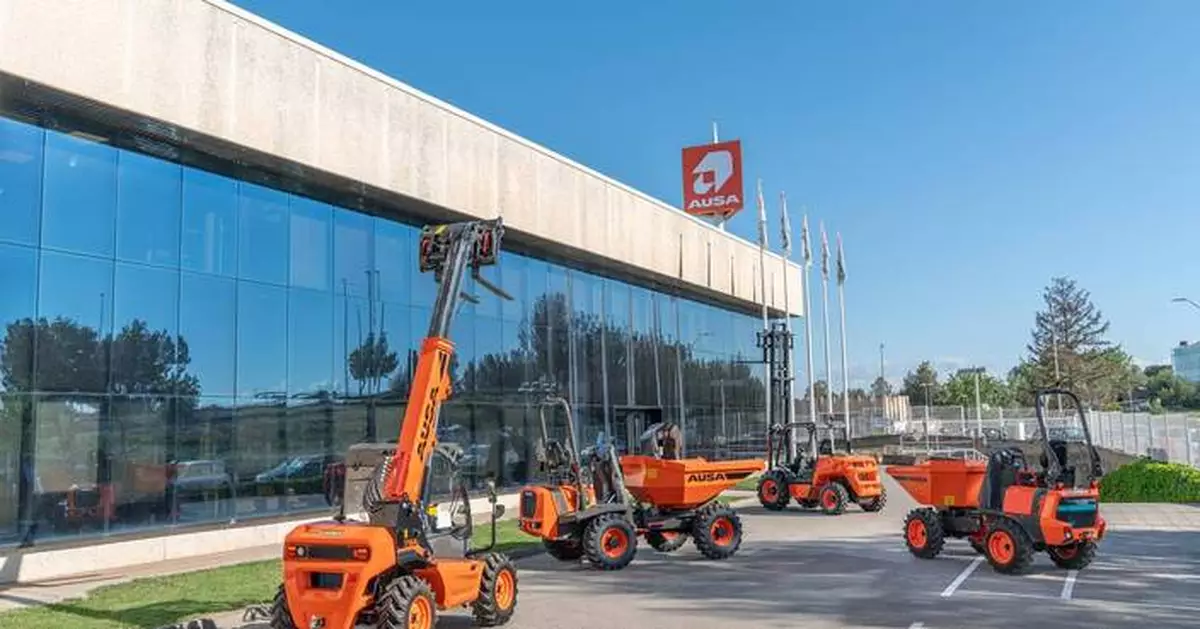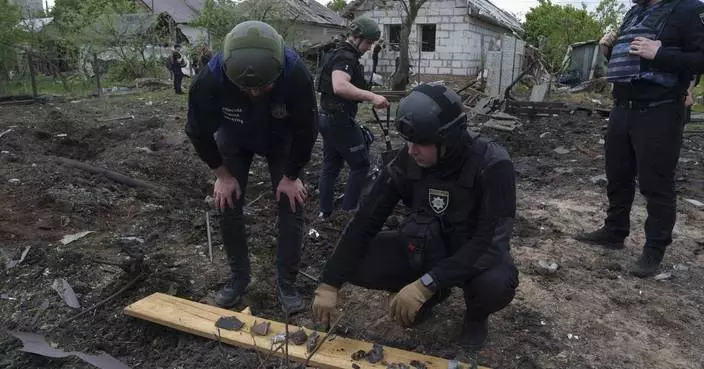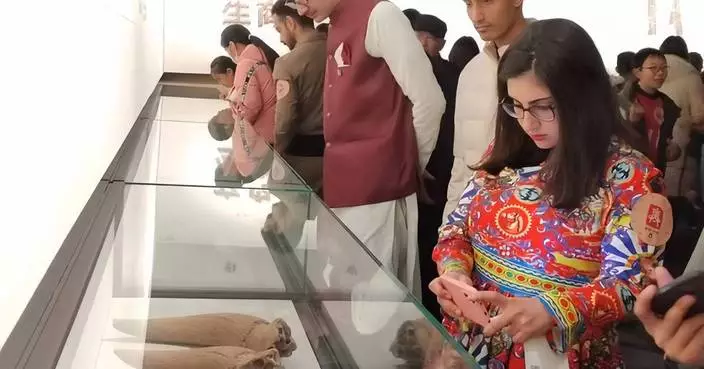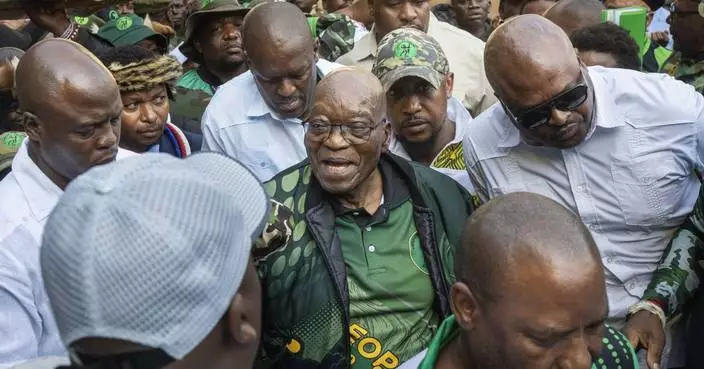OSHKOSH, Wis.--(BUSINESS WIRE)--May 8, 2024--
Oshkosh Corporation (NYSE: OSK), a leading innovator of purpose-built vehicles and equipment, today announced it has entered into a definitive agreement to acquire AUSACORP S.L. (AUSA), a privately held international company and manufacturer of wheeled dumpers, rough terrain forklifts and telehandlers for the construction, material handling, agriculture, landscape and specialty equipment industries. Upon closing, AUSA will become part of the Oshkosh Access segment.
This press release features multimedia. View the full release here: https://www.businesswire.com/news/home/20240508136258/en/
“AUSA’s history of producing high-quality, purpose-built equipment aligns with our Innovate. Serve. Advance. strategy, allowing us to broaden our product offerings in both current and adjacent markets,” said John Pfeifer, Oshkosh Corporation’s president and chief executive officer. “We look forward to welcoming the AUSA team into the Oshkosh family.”
AUSA products will enhance the JLG ® line of telehandlers, as well as Hinowa tracked dumpers and forklifts to strengthen the Access segment’s portfolio of equipment. The companies began working together through a partner agreement in 2020, with AUSA manufacturing the JLG-branded SkyTrak ® 3013 compact telehandler.
“We are excited to join forces with a proven partner like AUSA,” said Mahesh Narang, executive vice president Oshkosh Corporation, and president, Access. “Combining our advanced technology capabilities and robust training, support and service infrastructures will allow us to better serve customers and enable targeted growth.”
“We constantly pursue excellence in our products, services and business,” said Ramon Carbonell, AUSA’s chief executive officer. “A deeper relationship with Oshkosh will expand the reach of our products, which is an objective our companies share.”
AUSA, which was founded in 1956 in Barcelona, Spain, reported sales of approximately $132 million euros in 2023. The company’s near 350 team members and 600 dealers bring with them a long history of innovation, quality and customer service.
The AUSA acquisition supports the Oshkosh accelerated growth strategy. The transaction, which is subject to customary closing conditions, is expected to close within 90 days.
About Oshkosh Corporation
At Oshkosh (NYSE: OSK), we make innovative, mission-critical equipment to help everyday heroes advance communities around the world. Headquartered in Wisconsin, Oshkosh Corporation employs approximately 17,000 team members worldwide, all united behind a common purpose: to make a difference in people’s lives. Oshkosh products can be found in more than 150 countries under the brands of JLG®, Hinowa, Power Towers, Pierce®, MAXIMETAL, Oshkosh® Defense, McNeilus®, IMT®, Jerr-Dan®, Frontline™ Communications, Oshkosh® Airport Products, Oshkosh AeroTech™ and Pratt Miller. For more information, visit oshkoshcorp.com.
®, ™ All brand names referred to in this news release with the exception of AUSA are trademarks of Oshkosh Corporation or its subsidiary companies.
About JLG
JLG ® Industries, Inc. is a world-leading designer, manufacturer, and marketer of access equipment. The Company’s diverse product portfolio includes leading brands such as JLG ® aerial work platforms; JLG and SkyTrak ® telehandlers and rotary telehandlers; and an array of complementary accessories that increase the versatility and efficiency of these products. JLG is an Oshkosh Corporation business [NYSE: OSK]. For more information about JLG Industries, Inc., visit www.jlg.com, or find us on Twitter [twitter.com], Facebook [facebook.com], LinkedIn [linkedin.com], Instagram [instagram.com] and YouTube [youtube.com].
About AUSA
Established in 1956, AUSA is a company that specializes in the design, manufacturing and sale of compact all-terrain industrial vehicles (dumpers, forklifts and telescopic handlers) designed for the residential, civil and road construction industry and for the transportation and handling of industrial and agricultural materials. With its headquarters in Manresa (Barcelona), Spain, AUSA operates in 90 countries and has subsidiaries in Madrid, France, the United Kingdom, Germany, the US and China. Its firm commitment to innovation, providing more efficient and safer technological solutions for its customers and its commitment to people and talent have made AUSA a leading company in its sector.
Forward Looking Statements
This news release contains statements that the Company believes to be “forward-looking statements” within the meaning of the Private Securities Litigation Reform Act of 1995. All statements other than statements of historical fact, including, without limitation, statements regarding the Company’s future financial position, business strategy, targets, projected sales, costs, earnings, capital expenditures, debt levels and cash flows, and plans and objectives of management for future operations, are forward-looking statements. When used in this news release, words such as “may,” “will,” “expect,” “intend,” “estimate,” “anticipate,” “believe,” “should,” “project,” “confident” or “plan” or the negative thereof or variations thereon or similar terminology are generally intended to identify forward-looking statements. These forward-looking statements are not guarantees of future performance and are subject to risks, uncertainties, assumptions and other factors, some of which are beyond the Company’s control, which could cause actual results to differ materially from those expressed or implied by such forward-looking statements. These factors include the possibility that the parties will fail to obtain necessary regulatory approvals or to satisfy any of the other conditions to the proposed transaction; potential negative effects relating to the announcement of the proposed transaction; failure to realize the expected benefits of the transaction or expected synergies; difficulties in predicting results of operations of an acquired business; the cyclical nature of the Company’s access equipment, fire apparatus, refuse and recycling collection and air transportation equipment markets, which are particularly impacted by the strength of U.S. and European economies and construction seasons; the Company’s estimates of access equipment demand which, among other factors, is influenced by historical customer buying patterns and rental company fleet replacement strategies; the strength of the U.S. dollar and its impact on Company exports, translation of foreign sales and the cost of purchased materials; risks related to the collectability of receivables, particularly for those businesses with exposure to construction markets; risks associated with international operations and sales, including compliance with the Foreign Corrupt Practices Act; and risks related to the Company’s ability to successfully execute on its strategic road map and meet its long-term financial goals and other risks, uncertainties, assumptions and other factors impacting future results of the Company.


Oshkosh Corporation today announced it has entered into a definitive agreement to acquire AUSACORP S.L. (AUSA), a privately held international company and manufacturer of wheeled dumpers, rough terrain forklifts and telehandlers for the construction, material handling, agriculture, landscape and specialty equipment industries. Upon closing, AUSA will become part of the Oshkosh Access segment. (Photo: Business Wire)
TAIPEI, Taiwan (AP) — In a campaign ad for Taiwan’s President-elect Lai Ching-te, incumbent President Tsai Ing-wen was shown driving with Lai in the passenger seat, exchanging reflections on their years governing together. Tsai later turned over the driving to Lai, who was joined by running mate Bi-khim Hsiao.
The message was clear: Lai would steer the island in the direction set by Tsai, who after eight years in power was barred from running again.
Lai, 64, will take office Monday. Continuing Tsai’s legacy means aiming to strike a balance between cultivating Taiwan’s unofficial alliance with the United States and maintaining peace with China, which claims Taiwan as its own territory, to be retaken by force if necessary.
Lai is also expected to build on some of Tsai’s domestic reforms, despite political gridlock. Lai and Tsai’s Democratic Progressive Party has lost the majority in the legislature, making it hard for Lai to push through legislation, including the approval of crucial national defense budgets.
Tsai, 67, has been Taiwan’s first female president and one of Asia’s few female leaders who didn’t hail from a political dynasty. Her legacy will be tied to defending the island’s sovereignty from China while refashioning it as a credible partner for the U.S. and other democracies. She will also be remembered for overseeing the legalization of same sex-marriage, steering Taiwan through the COVID years and kickstarting the island’s military modernization.
She leaves office with high approval ratings. A recent poll by broadcaster TVBS showed 42% of respondents were satisfied with her eight-year performance. Her predecessor, Ma Ying-jeou, left office with approval ratings of around 23%.
Tsai’s popularity partly reflects a shift in Taiwan’s identity. A vast majority of residents now identify as Taiwanese as opposed to Chinese and want to be governed separately from Beijing. Taiwan and China have had different governments since a civil war in 1949 saw the Nationalists flee to the island while China’s Communist Party took control of the mainland.
Tsai veered from the more China-friendly policies of the previous ruling party, the Kuomintang. By the end of Ma’s tenure, the frequent exchanges with Beijing were making many Taiwanese nervous, said Shelley Rigger, a Taiwan expert at Davidson College.
Beijing called Tsai a separatist after she refused to acknowledge the 1992 Consensus, an agreement which says Taiwan is part of “One China.” While pulling away from Beijing, however, Tsai left a door open for communication.
“President Tsai has always said that Taiwan, under her leadership, is happy, willing and eager to have dialogue with Beijing, just not on terms unilaterally imposed by Beijing,” said Wen-Ti Sung, a fellow with Washington-based think tank Atlantic Council.
China has not only declined to speak to Tsai but also ramped up military and economic pressure on the island, sending warships and military jets near it daily.
Beijing prevents countries it has diplomatic relations with from having formal ties with Taipei. During Tsai’s tenure, it intensified a campaign to lure away the island’s few diplomatic partners. During Tsai’s years in office, China poached almost half of Taiwan’s diplomatic allies, bringing the remaining number to 12.
Tsai pushed back by diversifying trade relationships and increasing military spending including submarine development. She also elevated Taiwan’s standing on the international stage, said outgoing Foreign Minister Joseph Wu.
“Her leadership style is very moderate, but at the same time very firm in dealing with any kind of international pressure,” he said.
“She strengthened awareness of Taiwan around the world and its ties with the international community,” said Bonnie Glaser, the director of the Indo-Pacific program at the German Marshall Fund of the United States.
Lai, who served as vice president during Tsai's second term, came across as more of a firebrand earlier in his career. In 2017, he described himself as a “pragmatic worker for Taiwan’s independence,” drawing Beijing’s rebuke. He has since softened his stance and now supports maintaining the status quo across the Taiwan Strait and the possibility of talks with Beijing.
“Lai has spent the last two-plus years trying to convince the world that he is Tsai Ing-wen 2.0,” said Lev Nachman, an assistant professor at National Chengchi University.
Lai will build on Tsai’s efforts to strengthen ties with the U.S., which doesn’t formally recognize Taiwan as a country but is bound by its own laws to provide the island with the means to defend itself.
By some measures, Lai’s greatest uncertainty on the foreign policy front might come from Washington. A new Donald Trump administration could throw off whatever balance Tsai has achieved in Taipei’s relations with Washington and Beijing, Nachman said.
During Tsai's tenure, Taiwan became the first society in Asia to legalize same-sex marriage, though critics say she skirted political responsibility by leaving the decision up to the Supreme Court and a series of referendums.
She oversaw a controversial pension and labor reform and extended the military conscription length to one year. She also kickstarted a military modernization drive, including a program for building indigenous submarines at more than $16 billion each.
Tsai’s leadership during the COVID pandemic split public opinion, with most admiring Taiwan’s initial ability to keep the virus largely outside its borders but criticizing the lack of investment in rapid testing as the pandemic progressed.
Tsai’s mixed success on the domestic policy front contributed to historically poor results for the DPP in local elections, said Sung with the Atlantic Council. The party’s poor performance in the 2022 elections led to Tsai resigning as party chairwoman. And while Lai won the presidential election, DPP lost its majority in the legislature.
“Much of President Tsai’s government’s success comes from the foreign policy and related international outreach fronts, and in terms of making inroads on the much more grassroots party machinery level, for example, those still have room for improvement,” Sung said.

A supporter of opposition Taiwan People's Party (TPP) holds a guava, symbolizing dishonored ballot during a march to protest against Lai Ching-te's ruling Democratic Progressive party a day before his presidential inauguration in Taipei, Taiwan, Sunday, May 19, 2024. TPP demands that Lai''s government must implement parliamentary, judicial and constitutional reforms. (AP Photo/Chiang Ying-ying)

Supporters of opposition Taiwan People's Party (TPP) stage a rally to protest against Lai Ching-te’s ruling Democratic Progressive party, a day before his presidential inauguration in Taipei, Taiwan, Sunday, May 19, 2024. TPP demands that Lai's government must implement parliamentary, judicial and constitutional reforms. (AP Photo/Chiang Ying-ying)

Supporters of opposition Taiwan People's Party (TPP) gather to protest against Lai Ching-te’s ruling Democratic Progressive party, a day before his presidential inauguration in Taipei, Taiwan, Sunday, May 19, 2024. TPP demands that Lai's government must implement parliamentary, judicial and constitutional reforms. (AP Photo/Chiang Ying-ying)

Supporters of opposition Taiwan People's Party (TPP) march to protest against Lai Ching-te’s ruling Democratic Progressive party, a day before his presidential inauguration in Taipei, Taiwan, Sunday, May 19, 2024. TPP demands that Lai's government must implement parliamentary, judicial and constitutional reforms. (AP Photo/Chiang Ying-ying)

FILE - Taiwan's President Tsai Ing-wen delivers a speech during the naming and launching ceremony of domestically-made submarines at CSBC Corp's shipyards in Kaohsiung, southern Taiwan, Sept. 28, 2023. Taiwan's president-elect Lai Ching-te is set to take office on May 20. Building on the legacy of incumbent president Tsai, Ing-wen means aiming to strike a balance between cultivating Taiwan's unofficial alliance with the United States, and maintaining peace with China, which claims Taiwan as its own territory, to be retaken by force if necessary. (AP Photo/Chiang Ying-ying, File)

FILE - In this photo released by the Taiwan Presidential Office, Taiwan's President Tsai Ing-wen, speaks at a luncheon during a visit by a Congressional delegation to Taiwan in Taipei, Taiwan, April 8, 2023. Taiwan's president-elect Lai Ching-te is set to take office on May 20. Building on the legacy of incumbent president Tsai, Ing-wen means aiming to strike a balance between cultivating Taiwan's unofficial alliance with the United States, and maintaining peace with China, which claims Taiwan as its own territory, to be retaken by force if necessary. (Taiwan Presidential Office via AP, File)

Supporters watch an ad showing then Taiwan Democratic Progressive Party (DPP) presidential candidate Lai Ching-te in a car driven by incumbent president Tsai Ing-wen during a rally held in New Taipei, Taiwan, on Saturday, Jan. 6, 2024. In the campaign ad, Taiwan's president-elect Lai Ching-te and incumbent president Tsai Ing-wen was shown driving steadily on the island's roads with Lai in the passenger seat, exchanging barbs and reflections on their years governing together. (AP Photo/Ng Han Guan)

FILE - Taiwan Democratic Progressive Party (DPP) presidential candidate Lai Ching-te, who also goes by William, is greeted by supporters during an election canvass of a neighborhood in Taoyuan, Taiwan, Jan. 11, 2024, ahead of the presidential election. Lai Ching-te is set to take office as Taiwan's new president on May 20. Building on the legacy of incumbent president Tsai, Ing-wen means aiming to strike a balance between cultivating Taiwan's unofficial alliance with the United States, and maintaining peace with China, which claims Taiwan as its own territory, to be retaken by force if necessary. (AP Photo/Louise Delmotte, File)

FILE - Taiwanese Vice President Lai Ching-te, also known as William Lai celebrates his victory after Taiwan's presidential election, in Taipei, Taiwan, Saturday, Jan. 13, 2024. Lai Ching-te is set to take office as Taiwan's new president on May 20. Building on the legacy of incumbent president Tsai, Ing-wen means aiming to strike a balance between cultivating Taiwan's unofficial alliance with the United States, and maintaining peace with China, which claims Taiwan as its own territory, to be retaken by force if necessary. (AP Photo/Chiang Ying-ying, File)




















